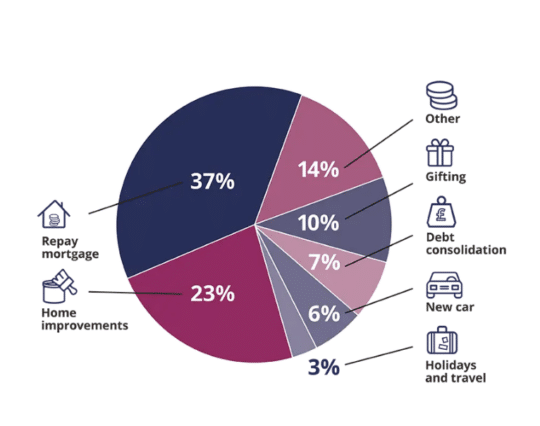Lifetime Mortgage Rules – Current Laws and Pitfalls
Our preferred equity release adviser is Age Partnership. For free and impartial money advice you can visit MoneyHelper.

Our preferred equity release adviser is Age Partnership. For free and impartial money advice you can visit MoneyHelper.
Are you wondering what are the lifetime mortgage rules you need to know? You’ve come to the right place for answers. Every month, over 7,000 people just like you visit our website to get clear advice on lifetime mortgages.
In this article, we’ll address the following questions:
- What is a lifetime mortgage and how does it work?
- Who qualifies for a lifetime mortgage?
- Can you take out a lifetime mortgage on any property?
- How much interest will you pay with a lifetime mortgage?
- Can you pay off a lifetime mortgage early?
Last year, 51% of new lifetime mortgage customers used their funds mainly for home improvements to make their ‘forever homes’ better.1
So, if you’re considering a lifetime mortgage for similar reasons, it’s important to understand the latest regulations and potential pitfalls associated with these financial products.
Don’t worry, we’re here to provide you with the necessary information. Let’s get started!
What is a lifetime mortgage?
A lifetime mortgage is a loan available to senior homeowners who don’t have an outstanding mortgage debt.
It is one of two loans that are classified as equity release plans.
The other type of equity release plan is called a home reversion scheme, but it’s used less often because it involves selling a percentage of your home to the lender.
Equity release comparison
I’ve put together this quick table to help you better understand the main differences between a lifetime mortgage and a home reversion plan.
| Category | Home Reversion Plan | Lifetime Mortgage |
|---|---|---|
| Ownership of the Property | You will sell either a portion of or the whole value of the home and then be allowed to stay on the property as a tenant. The lender will become a co-owner. | When you take out the secured loan against the property, it will remain in your ownership until you pass/move into long-term care. |
| Change in Value of the Property | With a co-ownership, you will be directly impacted by the property’s value in current markets. This means that you could just as easily lose out on money in the case of a value decrease as you could benefit from an increase. | Since this loan is typically paid off by the sale of the property after passing/owner is moved into long-term care, the value of the home after this case may impact how much money will be left to the estate/family once it has been sold. |
| Inheritance | While some plans do offer a guaranteed inheritance amount, it is likely that the inheritance will be dramatically reduced because you’ve sold a large portion of the property. | Some lifetime mortgages allow for an inheritance protection scheme, but the overall inheritance amount is decided by the loan size and accrued interest. |
| Repayment | No repayment required during your lifetime. It will be paid back once the property is sold. | Some lifetime mortgages allow for partial, voluntary repayments during your lifetime. However, the majority of the loan will be paid back once the property is sold. |
| Type of Payment | There is a choice between a lump sum payment or a regular income with this loan. You can also choose a mixture of the two. | You can either receive a lump sum loan, or you can choose a drawdown facility which allows you to take out money whenever you need it. |
How does a lifetime mortgage work?
Lifetime mortgages allow the homeowner to borrow against some of the value in their residential property.
They receive a loan which is charged with interest.
But the homeowner doesn’t have to make repayment on the loan or the interest each month, which is standard practice on most loans.
The loan gets bigger over time as interest is added and no repayments are made. The debt must be repaid when the homeowner sells their property.
But it’s often the case that people who take out a lifetime mortgage don’t ever intend to sell their home in the future, so the lender can force the sale when:
- The last surviving homeowner dies
- The last surviving homeowner moves into an aged care home or equivalent
» TAKE ACTION NOW: Find out how much equity you could release
Who qualifies for it?
To qualify for a lifetime mortgage you need to be at least 55 years old.
Both homeowners applying for a lifetime mortgage together will need to meet this minimum age requirement.
You don’t have to be retired like some people are led to believe:

Source: https://forums.moneysavingexpert.com/discussion/4583237/lifetime-mortgages
You can be too old for a lifetime mortgage, but it’s quite rare.
A handful of lifetime mortgage companies apply an upper age restriction. This age limit is usually set at 85 years old but it could go as high as 100 years old.
Can you take out a lifetime mortgage on any property?
You must take out the lifetime mortgage on your residential home where you habitually live and plan to keep living.
Remember, the debt becomes owed when you stop living there, even if you haven’t sold the property yourself, so buying to let isn’t really an option.
The property must be free from debt, so you’ll have to have already paid off your mortgage. Some lenders will allow you to clear your mortgage as part of the loan agreement.
Several properties can cause issues and result in a rejected lifetime mortgage. These include:
- Leaseholds with short leases
- Flood risk properties
- Park homes aren’t accepted ever
- Retirement homes are rarely accepted
- Properties with flat roofs
How equity release could help
More than 2 million people have used Age Partnership to release equity since 2004.
How your money is up to you, but here’s what their customers do…
Find out how much equity you could release by clicking the button below.
In partnership with Age Partnership.
How much interest will you pay?
Lifetime mortgages are typically subject to a fixed interest rate. Current deals offer loans with an interest rate between 2% and 8%, but you might be offered something different.
Lifetime mortgage interest rates are compounding.
This means the interest added is based on the loan amount and the previous interest you have accumulated.
Because you’re not making monthly repayments the debt is getting bigger instead of smaller each month. This causes the amount of interest added to increase as each month passes.
What can you use it for?
You can use the money received through a lifetime mortgage for any purpose or purchase you wish.
Some of the common reasons people take out a lifetime mortgage are to:
- Create financial security in later life
- Pay off existing debts
- Home improvements
- Help family members, usually to buy property
- Private medical care
Factors of mortgage repayment
Lifetime mortgages are known to be expensive debts to repay, even if you don’t have to make monthly repayments.
But the amount you’ll repay hinges on several factors.
The debt will grow based on your initial loan amount, the interest rate, and the length of time you have the lifetime mortgage.
As their name suggests, you are expected to have a lifetime mortgage for the remainder of your life.
So it’s impossible to know with any certainty how long you’ll have the loan and therefore how much you’ll need to repay.
But we can give you a standard example to show how much the debt could grow…
If we imagine your house is worth £195,000 and you take out a lifetime mortgage at 62. The lender will allow you to take 33% of your equity at this age, giving you a lump sum of £65,000. As part of the agreement, you accept a compounded interest rate of 6.4%.
At the age of 74, you need to leave your home to live in residential aged care and this triggers the lender’s right to sell your home and recover the debt. Due to the 12 years of compounding interest, the total owed will now stand just short of £137,000.
And this is how much will be collected by the lender from the sale proceeds.
What costs do you pay?
Along with the potential significant loan repayment cost, you will also need to pay for equity release advice, equity release solicitor services, and possibly brokerage services.
Some of these services can be provided by the same person or company.
You should expect to pay additional costs between £1,000 and £2,000. But some service providers might charge a commission rate instead, which is based on the size of your lifetime mortgage loan.
Can you pay off a lifetime mortgage early?
Yes, you can pay off a lifetime mortgage early if desired.
But you might be charged with an early repayment fee for doing so. The early repayment fee is usually an amount based on a percentage of the debt.
If the lender uses a fixed early repayment structure, the percentage you’ll pay depends on the number of years you’ve already held the lifetime mortgage.
In some cases, if you’ve held it for over eight years, you might not have to pay an early repayment cost.
Other lenders could use a variable early repayment structure.
These lenders use Gilt performance to determine how much to charge you to repay early. A Gilt is a type of bond with the UK Government.
Join thousands of others who release equity
Age Partnership have helped over 2 million people release equity from their home.

Mrs Wareham
“I am more than pleased to have taken out Equity Release with Age Partnership.”
Reviews shown are for Age Partnership. Search powered by Age Partnership.
Can you move home with a lifetime mortgage?
Yes, you can usually move to a property and take the lifetime mortgage with you, so you won’t need to pay it off. The new property must be of the same or a higher value, and it must be easy to sell in the future.
If you downsize to a less valuable property, you will need to pay the shortfall off and might owe early repayment charges.
These fees won’t be applied if your plan includes a downsizing clause.
What are the different types?
There isn’t just one type of lifetime mortgage. There are some variations on the lifetime mortgage explained above.
The three most common variations are:
Drawdown lifetime mortgages – they work the same but provide a drawdown loan instead of a lump sum. A drawdown loan is when you take parts of your loan in stages, which can be beneficial to maintain eligibility for means-tested benefits and can also reduce interest added.
Interest-only lifetime mortgages – these work in the same way but allow the homeowner to make voluntary interest repayments to stop the debt from growing. They can be a solution for people who feel guilty about denying estate beneficiaries their home when they pass away.
Enhanced lifetime mortgages – these work as described above but allow the homeowner to access more of their equity due to poor health. If you have poor health and a reduced life expectancy, the lender may allow you to access a bigger loan.
Is it right for you?
Lifetime mortgages shouldn’t be rushed into.
They need careful consideration and support from an equity release adviser. Receiving advice is now mandatory as part of Equity Release Council guidelines.
The adviser will assess your situation and see if there are other options before considering you for an equity release lifetime mortgage.


